An Analysis of the Impact of Political Influence on Criminal Justice
VerifiedAdded on 2020/05/08
|7
|1500
|480
Report
AI Summary
This report delves into the intricate relationship between politics and the criminal justice system, examining how political influence impacts various facets, from the selection of decision-makers like judges to the creation and amendment of laws. It explores the political involvement of prosecutors and analyzes the role of international courts such as the International Court of Justice, ICTY, and ICTR in maintaining law and order despite political barriers. The report highlights instances where political considerations may hinder impartial judgments and emphasizes the ongoing struggle for justice in the face of political interference, concluding with a call for emulating the ideals of international bodies in the field of criminal justice.
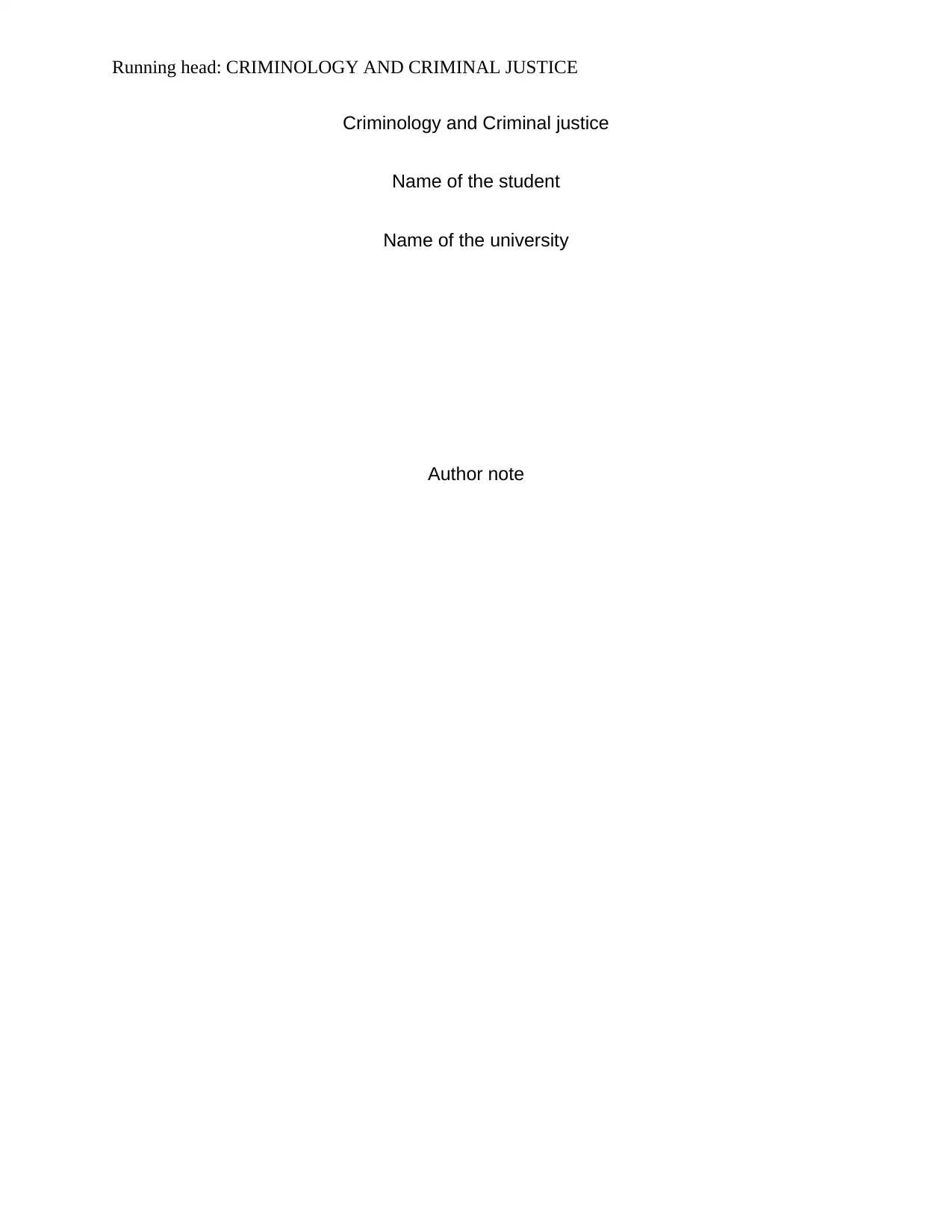
Running head: CRIMINOLOGY AND CRIMINAL JUSTICE
Criminology and Criminal justice
Name of the student
Name of the university
Author note
Criminology and Criminal justice
Name of the student
Name of the university
Author note
Paraphrase This Document
Need a fresh take? Get an instant paraphrase of this document with our AI Paraphraser
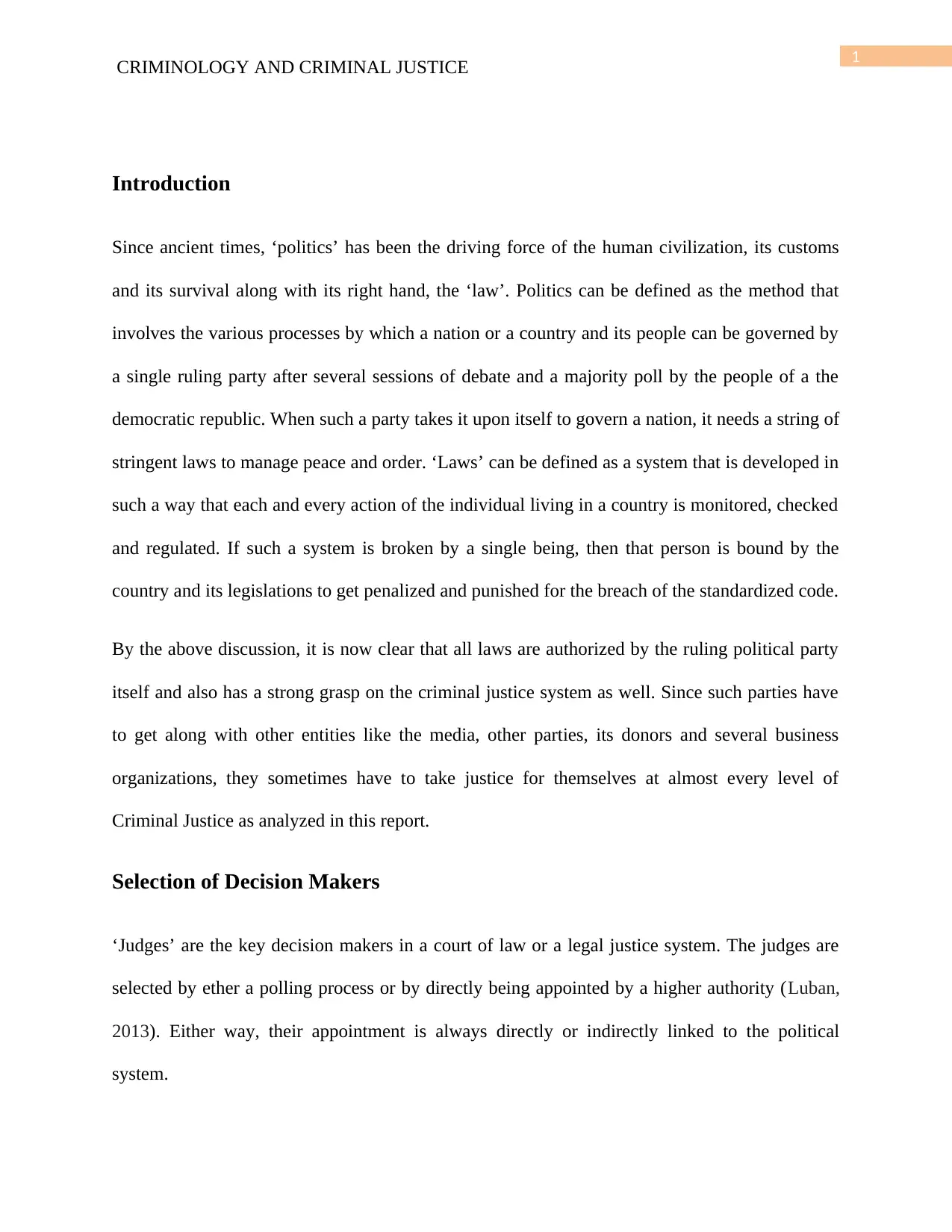
1
CRIMINOLOGY AND CRIMINAL JUSTICE
Introduction
Since ancient times, ‘politics’ has been the driving force of the human civilization, its customs
and its survival along with its right hand, the ‘law’. Politics can be defined as the method that
involves the various processes by which a nation or a country and its people can be governed by
a single ruling party after several sessions of debate and a majority poll by the people of a the
democratic republic. When such a party takes it upon itself to govern a nation, it needs a string of
stringent laws to manage peace and order. ‘Laws’ can be defined as a system that is developed in
such a way that each and every action of the individual living in a country is monitored, checked
and regulated. If such a system is broken by a single being, then that person is bound by the
country and its legislations to get penalized and punished for the breach of the standardized code.
By the above discussion, it is now clear that all laws are authorized by the ruling political party
itself and also has a strong grasp on the criminal justice system as well. Since such parties have
to get along with other entities like the media, other parties, its donors and several business
organizations, they sometimes have to take justice for themselves at almost every level of
Criminal Justice as analyzed in this report.
Selection of Decision Makers
‘Judges’ are the key decision makers in a court of law or a legal justice system. The judges are
selected by ether a polling process or by directly being appointed by a higher authority (Luban,
2013). Either way, their appointment is always directly or indirectly linked to the political
system.
CRIMINOLOGY AND CRIMINAL JUSTICE
Introduction
Since ancient times, ‘politics’ has been the driving force of the human civilization, its customs
and its survival along with its right hand, the ‘law’. Politics can be defined as the method that
involves the various processes by which a nation or a country and its people can be governed by
a single ruling party after several sessions of debate and a majority poll by the people of a the
democratic republic. When such a party takes it upon itself to govern a nation, it needs a string of
stringent laws to manage peace and order. ‘Laws’ can be defined as a system that is developed in
such a way that each and every action of the individual living in a country is monitored, checked
and regulated. If such a system is broken by a single being, then that person is bound by the
country and its legislations to get penalized and punished for the breach of the standardized code.
By the above discussion, it is now clear that all laws are authorized by the ruling political party
itself and also has a strong grasp on the criminal justice system as well. Since such parties have
to get along with other entities like the media, other parties, its donors and several business
organizations, they sometimes have to take justice for themselves at almost every level of
Criminal Justice as analyzed in this report.
Selection of Decision Makers
‘Judges’ are the key decision makers in a court of law or a legal justice system. The judges are
selected by ether a polling process or by directly being appointed by a higher authority (Luban,
2013). Either way, their appointment is always directly or indirectly linked to the political
system.
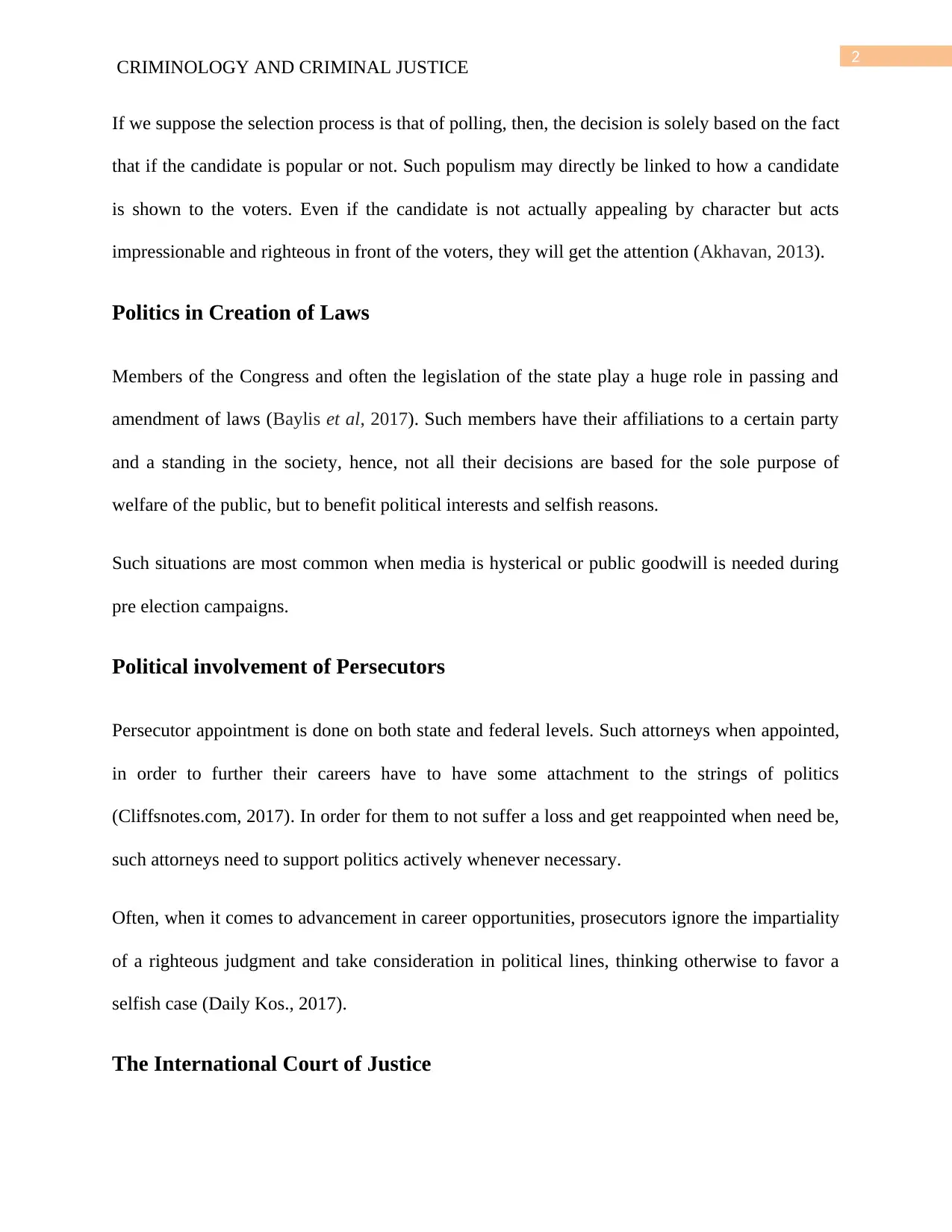
2
CRIMINOLOGY AND CRIMINAL JUSTICE
If we suppose the selection process is that of polling, then, the decision is solely based on the fact
that if the candidate is popular or not. Such populism may directly be linked to how a candidate
is shown to the voters. Even if the candidate is not actually appealing by character but acts
impressionable and righteous in front of the voters, they will get the attention (Akhavan, 2013).
Politics in Creation of Laws
Members of the Congress and often the legislation of the state play a huge role in passing and
amendment of laws (Baylis et al, 2017). Such members have their affiliations to a certain party
and a standing in the society, hence, not all their decisions are based for the sole purpose of
welfare of the public, but to benefit political interests and selfish reasons.
Such situations are most common when media is hysterical or public goodwill is needed during
pre election campaigns.
Political involvement of Persecutors
Persecutor appointment is done on both state and federal levels. Such attorneys when appointed,
in order to further their careers have to have some attachment to the strings of politics
(Cliffsnotes.com, 2017). In order for them to not suffer a loss and get reappointed when need be,
such attorneys need to support politics actively whenever necessary.
Often, when it comes to advancement in career opportunities, prosecutors ignore the impartiality
of a righteous judgment and take consideration in political lines, thinking otherwise to favor a
selfish case (Daily Kos., 2017).
The International Court of Justice
CRIMINOLOGY AND CRIMINAL JUSTICE
If we suppose the selection process is that of polling, then, the decision is solely based on the fact
that if the candidate is popular or not. Such populism may directly be linked to how a candidate
is shown to the voters. Even if the candidate is not actually appealing by character but acts
impressionable and righteous in front of the voters, they will get the attention (Akhavan, 2013).
Politics in Creation of Laws
Members of the Congress and often the legislation of the state play a huge role in passing and
amendment of laws (Baylis et al, 2017). Such members have their affiliations to a certain party
and a standing in the society, hence, not all their decisions are based for the sole purpose of
welfare of the public, but to benefit political interests and selfish reasons.
Such situations are most common when media is hysterical or public goodwill is needed during
pre election campaigns.
Political involvement of Persecutors
Persecutor appointment is done on both state and federal levels. Such attorneys when appointed,
in order to further their careers have to have some attachment to the strings of politics
(Cliffsnotes.com, 2017). In order for them to not suffer a loss and get reappointed when need be,
such attorneys need to support politics actively whenever necessary.
Often, when it comes to advancement in career opportunities, prosecutors ignore the impartiality
of a righteous judgment and take consideration in political lines, thinking otherwise to favor a
selfish case (Daily Kos., 2017).
The International Court of Justice
⊘ This is a preview!⊘
Do you want full access?
Subscribe today to unlock all pages.

Trusted by 1+ million students worldwide
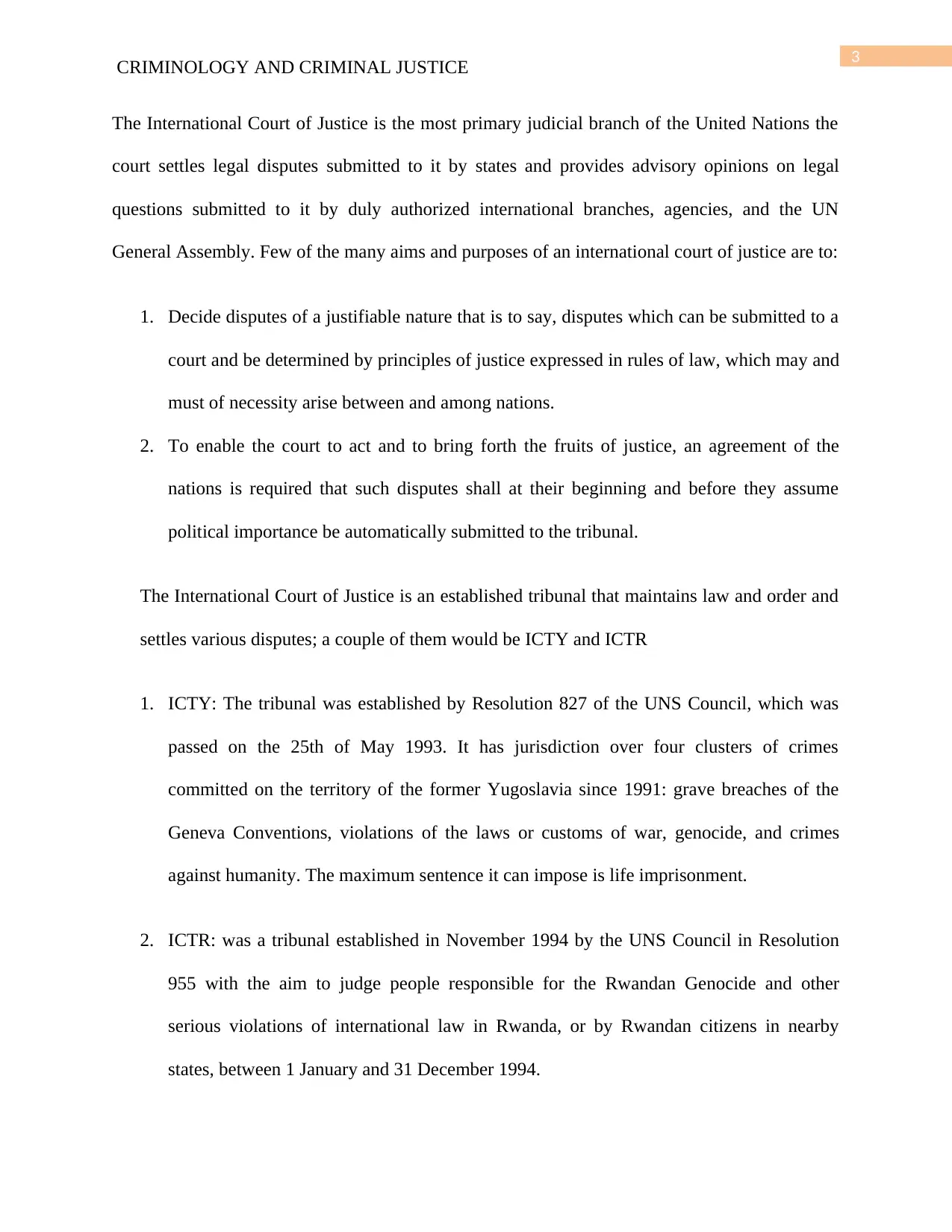
3
CRIMINOLOGY AND CRIMINAL JUSTICE
The International Court of Justice is the most primary judicial branch of the United Nations the
court settles legal disputes submitted to it by states and provides advisory opinions on legal
questions submitted to it by duly authorized international branches, agencies, and the UN
General Assembly. Few of the many aims and purposes of an international court of justice are to:
1. Decide disputes of a justifiable nature that is to say, disputes which can be submitted to a
court and be determined by principles of justice expressed in rules of law, which may and
must of necessity arise between and among nations.
2. To enable the court to act and to bring forth the fruits of justice, an agreement of the
nations is required that such disputes shall at their beginning and before they assume
political importance be automatically submitted to the tribunal.
The International Court of Justice is an established tribunal that maintains law and order and
settles various disputes; a couple of them would be ICTY and ICTR
1. ICTY: The tribunal was established by Resolution 827 of the UNS Council, which was
passed on the 25th of May 1993. It has jurisdiction over four clusters of crimes
committed on the territory of the former Yugoslavia since 1991: grave breaches of the
Geneva Conventions, violations of the laws or customs of war, genocide, and crimes
against humanity. The maximum sentence it can impose is life imprisonment.
2. ICTR: was a tribunal established in November 1994 by the UNS Council in Resolution
955 with the aim to judge people responsible for the Rwandan Genocide and other
serious violations of international law in Rwanda, or by Rwandan citizens in nearby
states, between 1 January and 31 December 1994.
CRIMINOLOGY AND CRIMINAL JUSTICE
The International Court of Justice is the most primary judicial branch of the United Nations the
court settles legal disputes submitted to it by states and provides advisory opinions on legal
questions submitted to it by duly authorized international branches, agencies, and the UN
General Assembly. Few of the many aims and purposes of an international court of justice are to:
1. Decide disputes of a justifiable nature that is to say, disputes which can be submitted to a
court and be determined by principles of justice expressed in rules of law, which may and
must of necessity arise between and among nations.
2. To enable the court to act and to bring forth the fruits of justice, an agreement of the
nations is required that such disputes shall at their beginning and before they assume
political importance be automatically submitted to the tribunal.
The International Court of Justice is an established tribunal that maintains law and order and
settles various disputes; a couple of them would be ICTY and ICTR
1. ICTY: The tribunal was established by Resolution 827 of the UNS Council, which was
passed on the 25th of May 1993. It has jurisdiction over four clusters of crimes
committed on the territory of the former Yugoslavia since 1991: grave breaches of the
Geneva Conventions, violations of the laws or customs of war, genocide, and crimes
against humanity. The maximum sentence it can impose is life imprisonment.
2. ICTR: was a tribunal established in November 1994 by the UNS Council in Resolution
955 with the aim to judge people responsible for the Rwandan Genocide and other
serious violations of international law in Rwanda, or by Rwandan citizens in nearby
states, between 1 January and 31 December 1994.
Paraphrase This Document
Need a fresh take? Get an instant paraphrase of this document with our AI Paraphraser
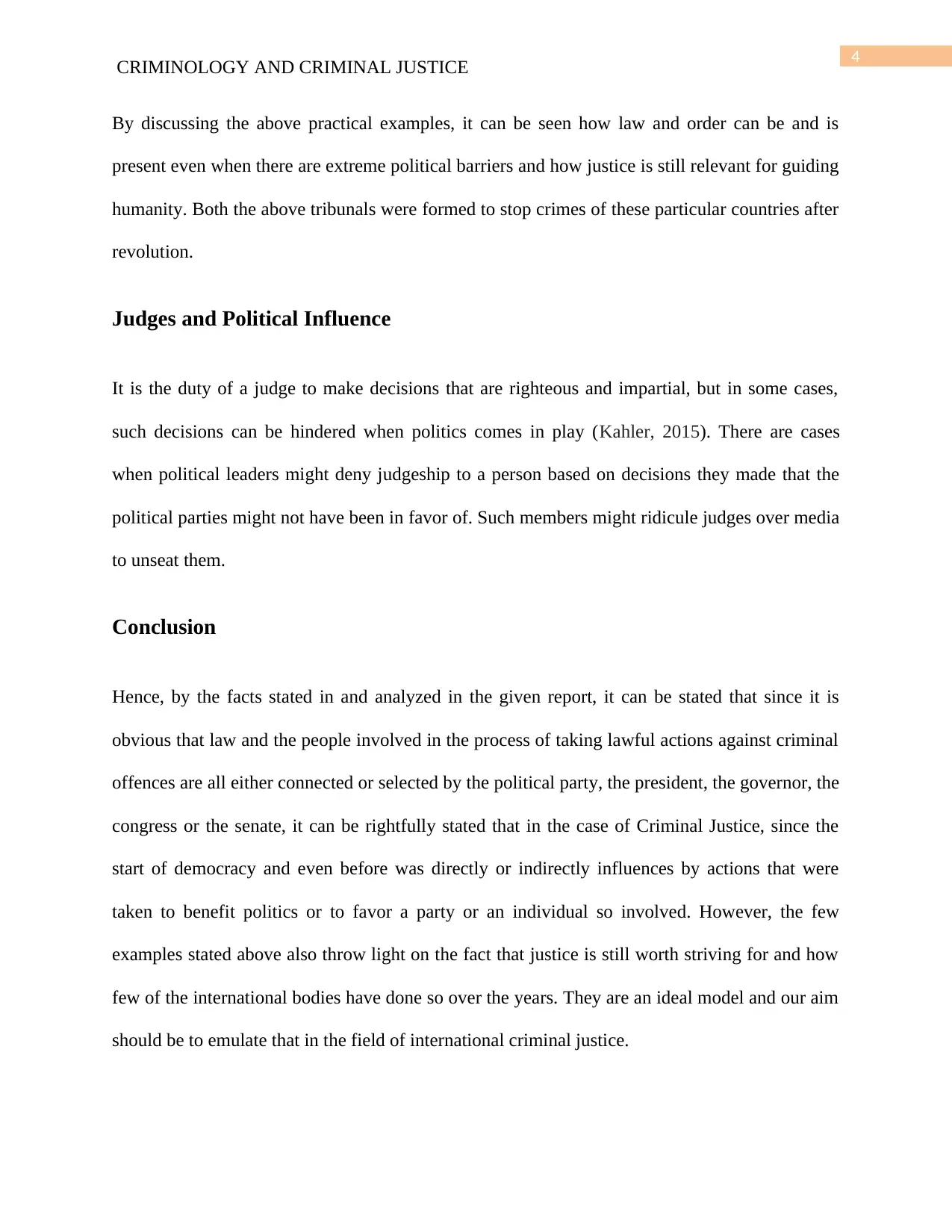
4
CRIMINOLOGY AND CRIMINAL JUSTICE
By discussing the above practical examples, it can be seen how law and order can be and is
present even when there are extreme political barriers and how justice is still relevant for guiding
humanity. Both the above tribunals were formed to stop crimes of these particular countries after
revolution.
Judges and Political Influence
It is the duty of a judge to make decisions that are righteous and impartial, but in some cases,
such decisions can be hindered when politics comes in play (Kahler, 2015). There are cases
when political leaders might deny judgeship to a person based on decisions they made that the
political parties might not have been in favor of. Such members might ridicule judges over media
to unseat them.
Conclusion
Hence, by the facts stated in and analyzed in the given report, it can be stated that since it is
obvious that law and the people involved in the process of taking lawful actions against criminal
offences are all either connected or selected by the political party, the president, the governor, the
congress or the senate, it can be rightfully stated that in the case of Criminal Justice, since the
start of democracy and even before was directly or indirectly influences by actions that were
taken to benefit politics or to favor a party or an individual so involved. However, the few
examples stated above also throw light on the fact that justice is still worth striving for and how
few of the international bodies have done so over the years. They are an ideal model and our aim
should be to emulate that in the field of international criminal justice.
CRIMINOLOGY AND CRIMINAL JUSTICE
By discussing the above practical examples, it can be seen how law and order can be and is
present even when there are extreme political barriers and how justice is still relevant for guiding
humanity. Both the above tribunals were formed to stop crimes of these particular countries after
revolution.
Judges and Political Influence
It is the duty of a judge to make decisions that are righteous and impartial, but in some cases,
such decisions can be hindered when politics comes in play (Kahler, 2015). There are cases
when political leaders might deny judgeship to a person based on decisions they made that the
political parties might not have been in favor of. Such members might ridicule judges over media
to unseat them.
Conclusion
Hence, by the facts stated in and analyzed in the given report, it can be stated that since it is
obvious that law and the people involved in the process of taking lawful actions against criminal
offences are all either connected or selected by the political party, the president, the governor, the
congress or the senate, it can be rightfully stated that in the case of Criminal Justice, since the
start of democracy and even before was directly or indirectly influences by actions that were
taken to benefit politics or to favor a party or an individual so involved. However, the few
examples stated above also throw light on the fact that justice is still worth striving for and how
few of the international bodies have done so over the years. They are an ideal model and our aim
should be to emulate that in the field of international criminal justice.
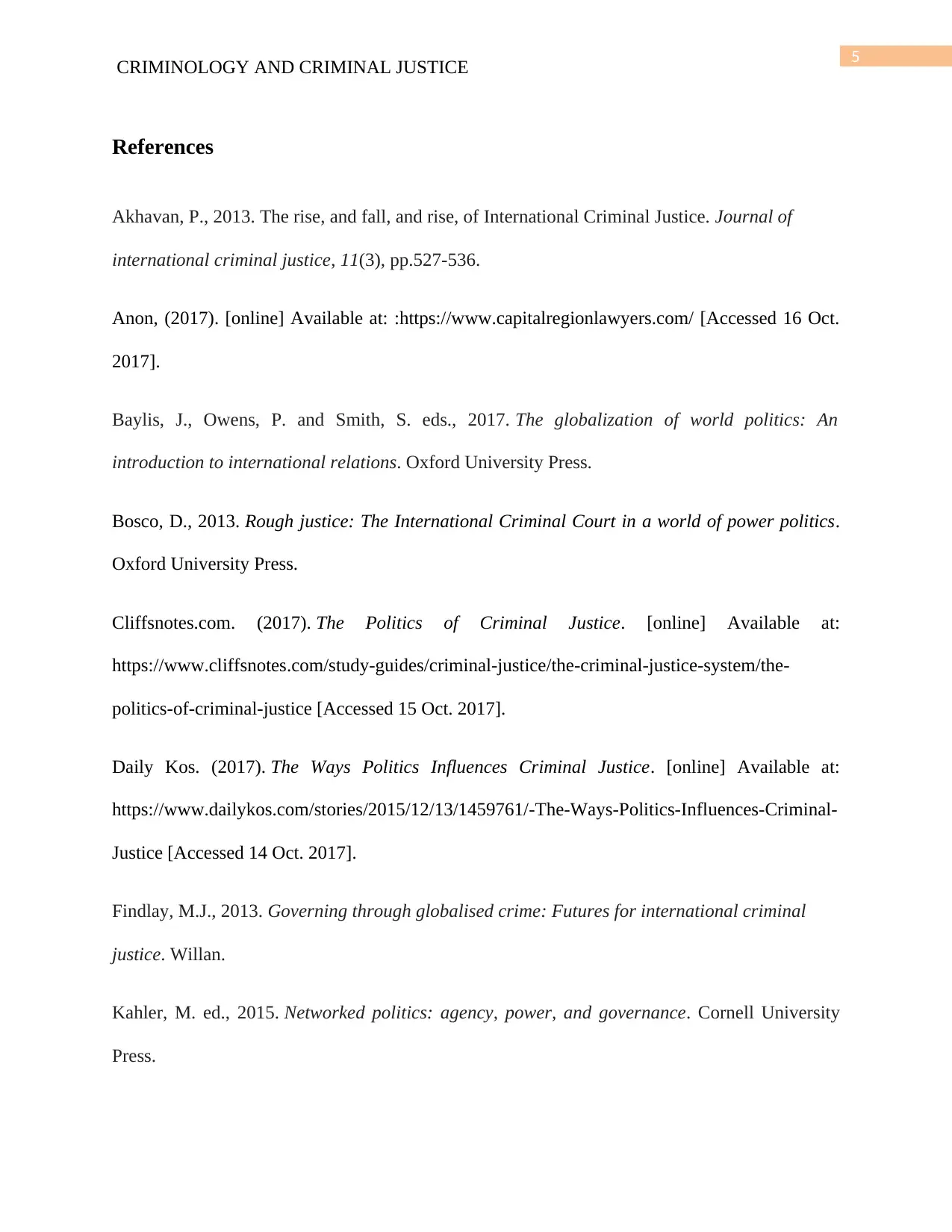
5
CRIMINOLOGY AND CRIMINAL JUSTICE
References
Akhavan, P., 2013. The rise, and fall, and rise, of International Criminal Justice. Journal of
international criminal justice, 11(3), pp.527-536.
Anon, (2017). [online] Available at: :https://www.capitalregionlawyers.com/ [Accessed 16 Oct.
2017].
Baylis, J., Owens, P. and Smith, S. eds., 2017. The globalization of world politics: An
introduction to international relations. Oxford University Press.
Bosco, D., 2013. Rough justice: The International Criminal Court in a world of power politics.
Oxford University Press.
Cliffsnotes.com. (2017). The Politics of Criminal Justice. [online] Available at:
https://www.cliffsnotes.com/study-guides/criminal-justice/the-criminal-justice-system/the-
politics-of-criminal-justice [Accessed 15 Oct. 2017].
Daily Kos. (2017). The Ways Politics Influences Criminal Justice. [online] Available at:
https://www.dailykos.com/stories/2015/12/13/1459761/-The-Ways-Politics-Influences-Criminal-
Justice [Accessed 14 Oct. 2017].
Findlay, M.J., 2013. Governing through globalised crime: Futures for international criminal
justice. Willan.
Kahler, M. ed., 2015. Networked politics: agency, power, and governance. Cornell University
Press.
CRIMINOLOGY AND CRIMINAL JUSTICE
References
Akhavan, P., 2013. The rise, and fall, and rise, of International Criminal Justice. Journal of
international criminal justice, 11(3), pp.527-536.
Anon, (2017). [online] Available at: :https://www.capitalregionlawyers.com/ [Accessed 16 Oct.
2017].
Baylis, J., Owens, P. and Smith, S. eds., 2017. The globalization of world politics: An
introduction to international relations. Oxford University Press.
Bosco, D., 2013. Rough justice: The International Criminal Court in a world of power politics.
Oxford University Press.
Cliffsnotes.com. (2017). The Politics of Criminal Justice. [online] Available at:
https://www.cliffsnotes.com/study-guides/criminal-justice/the-criminal-justice-system/the-
politics-of-criminal-justice [Accessed 15 Oct. 2017].
Daily Kos. (2017). The Ways Politics Influences Criminal Justice. [online] Available at:
https://www.dailykos.com/stories/2015/12/13/1459761/-The-Ways-Politics-Influences-Criminal-
Justice [Accessed 14 Oct. 2017].
Findlay, M.J., 2013. Governing through globalised crime: Futures for international criminal
justice. Willan.
Kahler, M. ed., 2015. Networked politics: agency, power, and governance. Cornell University
Press.
⊘ This is a preview!⊘
Do you want full access?
Subscribe today to unlock all pages.

Trusted by 1+ million students worldwide
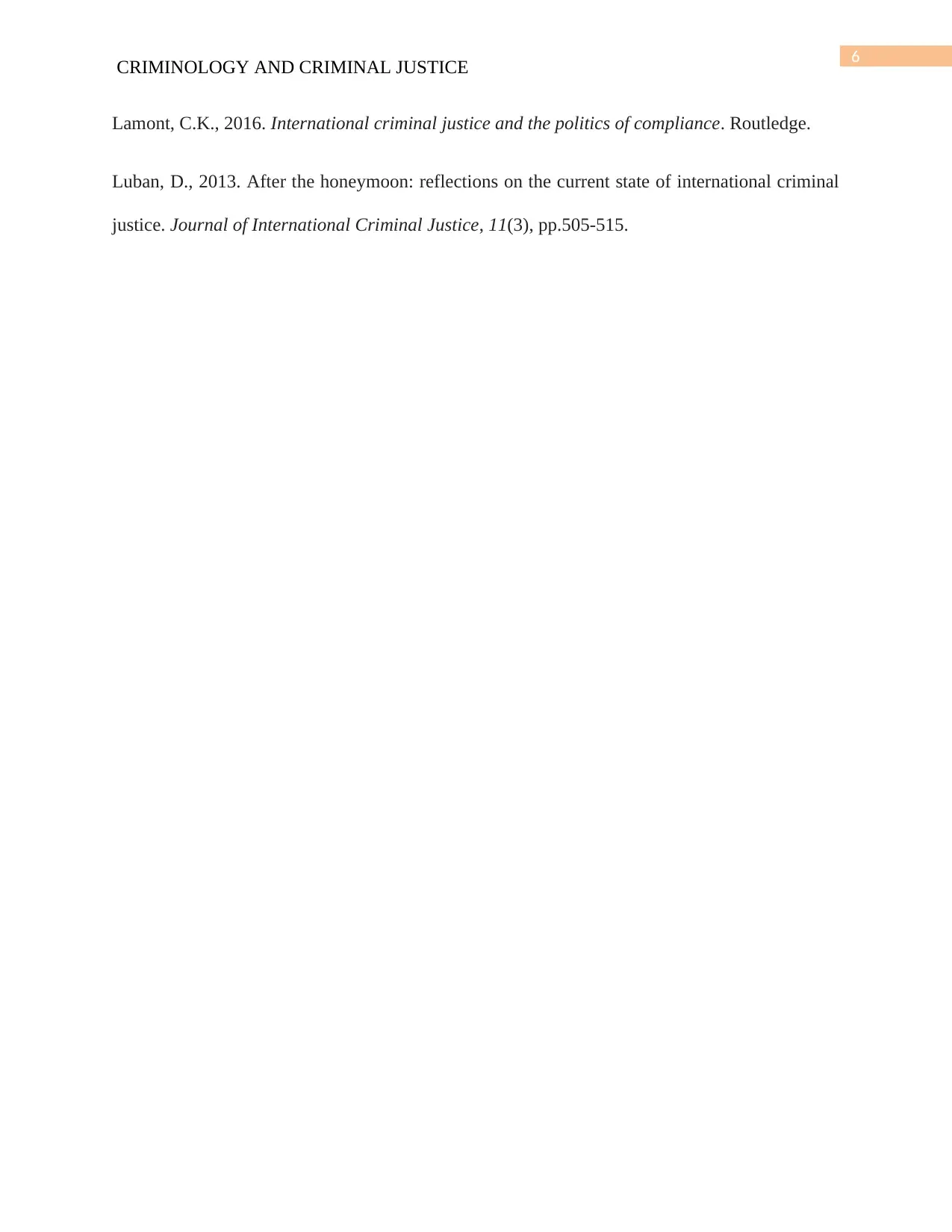
6
CRIMINOLOGY AND CRIMINAL JUSTICE
Lamont, C.K., 2016. International criminal justice and the politics of compliance. Routledge.
Luban, D., 2013. After the honeymoon: reflections on the current state of international criminal
justice. Journal of International Criminal Justice, 11(3), pp.505-515.
CRIMINOLOGY AND CRIMINAL JUSTICE
Lamont, C.K., 2016. International criminal justice and the politics of compliance. Routledge.
Luban, D., 2013. After the honeymoon: reflections on the current state of international criminal
justice. Journal of International Criminal Justice, 11(3), pp.505-515.
1 out of 7
Related Documents
Your All-in-One AI-Powered Toolkit for Academic Success.
+13062052269
info@desklib.com
Available 24*7 on WhatsApp / Email
![[object Object]](/_next/static/media/star-bottom.7253800d.svg)
Unlock your academic potential
Copyright © 2020–2025 A2Z Services. All Rights Reserved. Developed and managed by ZUCOL.





